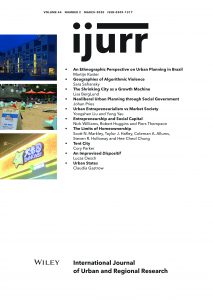Existing literature on China’s neoliberal urbanism is preoccupied with its institutional incentives and political‐economy dynamics, which are characterized by state dominance through sponsorship and supervision of capital‐market operations that drive pro‐growth aspirations and gentrification strategies. Meanwhile, society, confronted with brutal neoliberal production of urban space, is vulnerable to dispossession and displacement. In this article, we draw upon an ethnographic study conducted at the Higher Education Mega Centre (HEMC) of Guangzhou in an attempt to revisit China’s neoliberal urbanism beyond the Marxian political‐economy repertoire, and shift the theoretical focus from production to consumption. In an institutionalized neoliberal context, the state–market–society nexus is closely intertwined—a process that manifests itself as the entangling of state and market, the establishment of a market society, the reflexive effects between neoliberalization and Chinese urban entrepreneurialism, and the capital‐centric rule in urban (re)development. In particular, the socioeconomic and sociospatial contradictions in the HEMC case indicate aggressive and insatiable production of urban space, which has been led by the entrepreneurial local state, but is bounded by the market‐oriented and capital‐centric rules of institutionalized neoliberalization. The article concludes by calling for pragmatic reflection on the ‘hard’ neoliberal urbanism of the global South.
Details
Written by:
Yongshen Liu & Yung Yau
Digital Object Identifier (DOI)
10.1111/1468-2427.12859
About DOI

